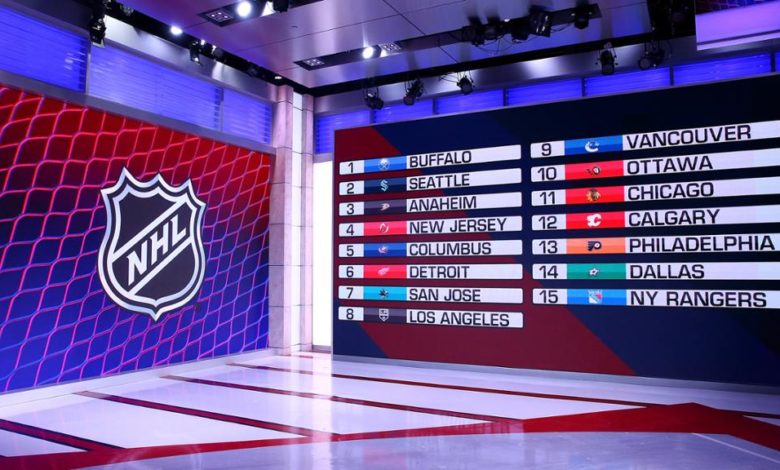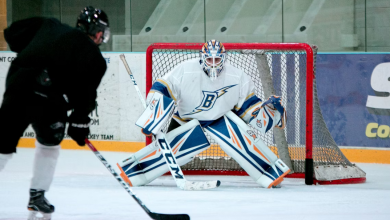Here’s the FULL Layout of the 2021 NHL Draft for all 224 picks to be made

The 2021 NHL Draft (First Round) will be taking place tonight.
The No. 29 and No. 30 picks belong to the teams that lost in the Stanley Cup Semifinals (New York Islanders, Vegas Golden Knights), in inverse order.
The Montreal Canadiens, who lost the Stanley Cup Final, have pick No. 31.
The No. 32 selection goes to the Stanley Cup champion, but the Tampa Bay Lightning traded their first-round pick to the Columbus Blue Jackets as part of the deal to acquire defenseman David Savard on April 10.
The first round will be held July 23, and rounds 2-7 are July 24.
The Blue Jackets have three first-round picks: theirs at No. 5, the No. 25 selection, which was acquired from the Toronto Maple Leafs as part of the trade for forward Nick Foligno on April 11, and the No. 32 choice.
The New Jersey Devils, Detroit Red Wings and Minnesota Wild each have two picks in the first round.
The Devils have the No. 4 pick and the No. 29 selection, acquired from the Islanders as part of the trade for forwards Kyle Palmieri and Travis Zajac on April 7.
The Red Wings have the No. 6 pick and the No. 23 selection, acquired from the Washington Capitals in the trade for forward Anthony Mantha on April 12.
The Wild have the No. 22 pick and the No. 26 selection, acquired from the Pittsburgh Penguins in the trade for forward Jason Zucker on Feb. 10, 2020.
2021 NHL DRAFT FIRST ROUND
Round 1
1. Buffalo Sabres
2. Seattle Kraken
3. Anaheim Ducks
4. New Jersey Devils
5. Columbus Blue Jackets
6. Detroit Red Wings
7. San Jose Sharks
8. Los Angeles Kings
9. Vancouver Canucks
10. Ottawa Senators
11. Forfeited pick*
12. Chicago Blackhawks
13. Calgary Flames
14. Philadelphia Flyers
15. Dallas Stars
16. New York Rangers
17. St. Louis Blues
18. Winnipeg Jets
19. Nashville Predators
20. Edmonton Oilers
21. Boston Bruins
22. Minnesota Wild
23. Detroit Red Wings (from WSH)
24. Florida Panthers
25. Columbus Blue Jackets (from TOR)
26. Minnesota Wild (from PIT)
27. Carolina Hurricanes
28. Colorado Avalanche
29. New Jersey Devils (from NYI)
30. Vegas Golden Knights
31. Montreal Canadiens
32. Columbus Blue Jackets (from TBL)*Pick 11
– The Coyotes were forced to surrender their 2021 first-round pick, as well as last year’s second-round pick, after violating the NHL’s rules on pre-combine testing.
Round 2
33. Buffalo Sabres
34. Anaheim Ducks
35. Seattle Kraken
36. Vegas Golden Knights (from NJD)
37. Arizona Coyotes (from CBJ-OTT)
38. Detroit Red Wings
39. Ottawa Senators (from SJS)
40. Nashville Predators (from LAK)
41. Vancouver Canucks
42. Ottawa Senators
43. Arizona Coyotes
44. Chicago Blackhawks
45. Calgary Flames
46. Philadelphia Flyers
47. Dallas Stars
48. Detroit Red Wings (from NYR)
49. Los Angeles Kings (from STL-VGK-BUF)
50. Winnipeg Jets
51. Nashville Predators
52. New York Islanders (from DET-EDM)
53. Buffalo Sabres (from BOS)
54. Minnesota Wild
55. Washington Capitals
56. Florida Panthers
57. Toronto Maple Leafs
58. Pittsburgh Penguins
59. Carolina Hurricanes
60. Arizona Coyotes (from NYI-COL)
61. Colorado Avalanche (from NJ-NYI)
62. Chicago Blackhawks (from VGK)
63. Montreal Canadiens
64. Montreal Canadiens (from TBL)
Round 3
65. New York Rangers (from BUF)
66. Anaheim Ducks
67. Seattle Kraken
68. New Jersey Devils
69. Columbus Blue Jackets
70. Detroit Red Wings
71. San Jose Sharks
72. Los Angeles Kings
73. Dallas Stars (from VAN)
74. Ottawa Senators
75. Washington Capitals (from ARI-NJD)
76. Montreal Canadiens (from CHI)
77. Calgary Flames
78. Philadelphia Flyers
79. Dallas Stars
80. New York Rangers
81. St. Louis Blues
82. Winnipeg Jets
83. Nashville Predators
84. Calgary Flames (from EDM)
85. Boston Bruins
86. Minnesota Wild
87. Montreal Canadiens (from WSH-SJS)
88. Buffalo Sabres (from FLA)
89. Los Angeles Kings (from TOR)
90. Minnesota Wild (from PIT-SJS)
91. Carolina Hurricanes
92. Colorado Avalanche
93. New York Islanders
94. Carolina Hurricanes (from DET-VGK)
95. Buffalo Sabres (from MTL)
96. Tampa Bay Lightning
Round 4
97. Buffalo Sabres
98. Anaheim Ducks
99. Seattle Kraken
100. New Jersey Devils
101. Columbus Blue Jackets
102. Detroit Red Wings
103. San Jose Sharks
104. New York Rangers (from LAK)
105. Chicago Blackhawks (from VAN)
106. New York Rangers (from OTT)
107. Arizona Coyotes
108. Chicago Blackhawks
109. Los Angeles Kings (from CGY)
110. Philadelphia Flyers
111. Dallas Stars
112. New York Rangers
113. Montreal Canadiens (from STL)
114. Vegas Golden Knights (from WPG)
115. Nashville Predators
116. Edmonton Oilers
117. Boston Bruins
118. Minnesota Wild
119. Washington Capitals
120. Florida Panthers
121. San Jose Sharks (from TOR)
122. Arizona Coyotes (from PIT)
123. Carolina Hurricanes
124. Nashville Predators (from COL-OTT)
125. New York Islanders
126. Montreal Canadiens (from VGK)
127. Montreal Canadiens
128. Detroit Red Wings (from TBL)
Round 5
129. New Jersey Devils (from BUF)
130. Anaheim Ducks
131. Seattle Kraken
132. Columbus Blue Jackets (from NJD)
133. Columbus Blue Jackets
134. Detroit Red Wings
135. San Jose Sharks
136. Los Angeles Kings
137. Vancouver Canucks
138. Detroit Red Wings (from OTT-MTL)
139. Arizona Coyotes
140. Vancouver Canucks (from CHI)
141. Calgary Flames
142. Montreal Canadiens (from PHI)
143. Dallas Stars
144. New York Rangers
145. St. Louis Blues
146. Winnipeg Jets
147. Nashville Predators
148. Anaheim Ducks (from EDM-OTT)
149. Boston Bruins
150. Minnesota Wild
151. Washington Capitals
152. Florida Panthers
153. Toronto Maple Leafs
154. Pittsburgh Penguins
155. Vegas Golden Knights (from CAR)
156. San Jose Sharks (from COL)
157. New York Islanders
158. Philadelphia Flyers (from VGK-WSH)
159. Buffalo Sabres (from MTL)
160. Tampa Bay Lightning
Round 6
161. Buffalo Sabres
162. Anaheim Ducks
163. Seattle Kraken
164. New Jersey Devils
165. Columbus Blue Jackets
166. Detroit Red Wings
167. San Jose Sharks
168. Los Angeles Kings
169. Vancouver Canucks
170. Ottawa Senators
171. Arizona Coyotes
172. Chicago Blackhawks
173. Calgary Flames
174. Philadelphia Flyers
175. Dallas Stars
176. New York Rangers
177. St. Louis Blues
178. Vancouver Canucks (from WPG)
179. Nashville Predators
180. Edmonton Oilers
181. Boston Bruins
182. Minnesota Wild
183. Washington Capitals
184. Florida Panthers
185. Toronto Maple Leafs
186. Edmonton Oilers (from PIT)
187. Carolina Hurricanes
188. Buffalo Sabres (from COL)
189. New York Islanders
190. Vegas Golden Knights
191. Montreal Canadiens
192. Tampa Bay Lightning
Round 7
193. Buffalo Sabres
194. Pittsburgh Penguins (from ANA)
195. Seattle Kraken
196. Tampa Bay Lightning (from NJD)
197. Columbus Blue Jackets
198. St. Louis Blues (from DET)
199. San Jose Sharks
200. Carolina Hurricanes (from LAK)
201. Vancouver Canucks
202. Ottawa Senators
203. New Jersey Devils (from ARI)
204. Chicago Blackhawks
205. Calgary Flames
206. Philadelphia Flyers
207. Dallas Stars
208. New York Rangers
209. Carolina Hurricanes (from STL)
210. Florida Panthers (from WPG)
211. Tampa Bay Lightning (from NSH)
212. Edmonton Oilers
213. Boston Bruins
214. Minnesota Wild
215. Pittsburgh Penguins (from WSH)
216. Chicago Blackhawks (from FLA)
217. Boston Bruins (from TOR)
218. Pittsburgh Penguins
219. Carolina Hurricanes
220. Colorado Avalanche
221. New York Islanders
222. Vegas Golden Knights
223. Montreal Canadiens
224. Tampa Bay Lightning


[…] Source link […]